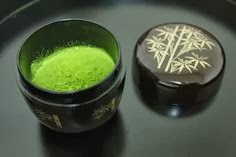Chanoyu, Sado or simply Ocha in Japanese is also called the The Japanese Tea Ceremony. The choreographic ritual of preparing and serving the Japanese green tea is also called Matcha and together with the traditional Japanese sweets to balance with the taste of tea. Preparing and serving tea in this ceremony means pouring all one's attention into the predefined movements. Prepare a bowl of tea is from one's person heart or mind is an about aesthetics. Host of the ceremony will considers the movement and gesture of guests. The placement of the tea utensils from the view point of the guests, the main guests also known as or called Shokyaku.
Matcha have two ways of preparing on tea ceremony which are koicha (thick) and usucha (thin). This two use the best quality tea leaves used in prepare thick tea. Koicha is a thick blend of matcha and hot water that requires about three times as much tea to the equivalent amount of water than usucha. Koicha is kneaded with the whisk to smoothly blend the large amount of powdered tea with the water when the matcha and hot water are whipped using the tea whisk which preparing on usucha. Thin tea is served to each guest in an individual bowl, while one bowl of thick tea is shared among several guests. These are the important part a Chanji which is the preparation and drinking of Koicha and it follow by Usucha.
To preparing and serving tea on tea ceremony is also need a tea equipment which called chadogu. A wide range of chadogu are available and different styles and motifs are used for different events and in different seasons because all the tools for tea ceremony are handled with exquisite care.They are also scrupulously cleaned the tea equipment before and after each use and before storing. It also have some are handled with glove hands.
There are a few of the essential components which are Chakin, Tea bowl, Tea caddy, Tea scoop, Tea whisk.
- Chakin is a small rectangular white linen or hemp cloth. It mainly is used to wipe the tea bowl.
 |
 |
| Picture of Chakin |
- Tea Bowl have a different styles are used for thick and tea tea. It also available in a wide range of sizes and styles. For example, Shallow bowls are allow the tea to cool rapidly and it used in summer. Deep bowls is used in winter. Bowls are frequently named by their creators or owners or by tea master. Bowls over four hundred years old are in use today but it only on unusually special occasions. Some bowls are extremely valuable and the best bowls are thrown by hand. They often featured prominently as the "front" of the bowl which have Irregularities and imperfections are prized.
.jpg) |
| Picture of Tea Bowl |
- Tea Caddy are the small lidded container in which the powdered tea is placed for use in the tea-making procedure Otemae.

Picture of Tea Caddy
- Tea Scoop are used to scoop tea from the tea caddy into the tea bowl. Bamboo tea scoops in the most casual style have a nodule in the approximate center. Larger scoops are used to transfer tea into the tea caddy in the mizuya which are the preparation area but these are not seen by guests. It also have a different styles and colours are used in various tea traditions.Tea scoop generally are carved from a single piece of bamboo, although they may also be made of ivory or wood.
 |
| Picture of Tea Scoop |



very beautiful~ awesome ~ interesting~ wonderful ~ I like it so much ~^^
ReplyDelete